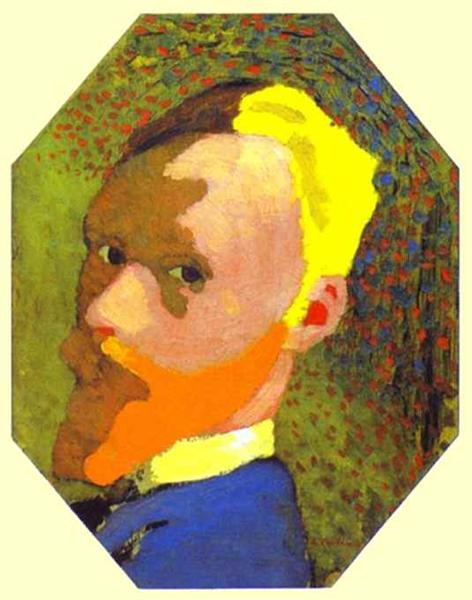Description
Edouard Vuillard, a leading member of the Nabis group, offers us in his work "Self -portrait" of 1891 an intimate and subjective vision of the author through its characteristic use of color and texture. This painting is not only a testimony of Vuillard's technical ability, but also a representation of the emotional state and the artist's psychology, fundamental characteristics in his style.
The composition of "self -portrait" focuses on the figure of Vuillard himself, which is presented in a seemingly daily environment, wrapping himself in the intimate atmosphere of his study. The color palette used is soft and terrous, predominantly brown and ocher tones, which confer a particular warmth to the work. This chromatic choice, linked to symbolism, suggests a personal and emotional connection between the artist and his work space. It is important to note that the use of subtle tones creates a silent, almost melancholic atmosphere, which invites the viewer to a deep reflection on the author's identity.
The background is decorated with a tissue of delicate patterns, something characteristic of Vuillard, who often incorporates decorative elements that add a layer of complexity to the represented space. This use of patterns not only reinforces the notion of a private environment, but also serves as a means to explore the relationship between the individual and their environment. In the portrait, the figure is presented with a slight turn of the body, which suggests an introspection and an approach to self -observation, recurring themes in the artist's work.
The author's facial expression is contemplative and something distant, which could be interpreted as an indication of the introspective nature of his personality. Not including narrative elements or additional characters that distract, Vuillard allows attention to concentrate on their own being, turning the canvas into a mirror that reflects not only its image, but its thoughts and emotions. This self -enhanced characteristic resonates with the spirit of the Nabi movement, which advocates personal expression and exploration of the subjective in art.
It is also interesting to place this work in the context of contemporary art of the late nineteenth century. The use that Vuillard of light and shadow makes, as well as his ability to create textures through loose brushstrokes, can be related to the works of other contemporaries such as Pierre Bonnard, who explored similarities in the representation of everyday life and intimacy . However, the particularity of Vuillard's "self -portrait" lies in the personal connection between the artist and his practice, as well as in the way in which he underlines the duality of being at the same time subject and observer.
In conclusion, "self -portrait" of 1891 is not only a portrait in the conventional sense, but is erected as a deep exploration of artistic and emotional identity. Vuillard, through his mastery in the use of color and his attention to detail, invites us to enter his internal world, turning the act of painting into a meditation on being, space and subjectivity. This work, although unique, becomes a representative example of the search for the Nabis for finding new ways of expression that transcend the mere visual representation and connect us with the essence of the creative being.
KUADROS ©, a famous paint on your wall.
Hand-made oil painting reproductions, with the quality of professional artists and the distinctive seal of KUADROS ©.
Art reproduction service with satisfaction guarantee. If you are not completely satisfied with the replica of your painting, we refund your money 100%.

